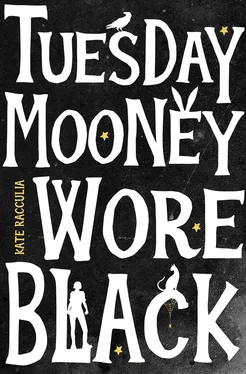Dex once asked if her general standoffishness, her “aversion to team sports,” as he called it, came from having grown up in Salem, stewing in the cultural detritus of mass hysteria and (literal) witch-hunting. Salem’s natural vibe was part of it. What happened with Abby Hobbes was part of it too, though Dex didn’t know Abby Hobbes existed. Technically it was possible Dex knew the name Abigail Hobbes. He would have been a teenager in western Massachusetts when the coverage of Abby’s disappearance was at its height, bleeding beyond Salem, though her story never spread as far as it might have – if they’d found her body, if the missing girl had been upgraded to a dead girl. But Dex wouldn’t have had any reason to connect Abigail Hobbes directly to Tuesday. For Dex to know, at the time of her disappearance, that Abby had been her best friend, Tuesday would have had to tell him herself.
“You don’t trust people in groups,” Dex had said to her once, while they were out at McFly’s, one of his regular haunts for karaoke. Well, Dex was there for karaoke. Tuesday was there to drink, and pointedly not to participate. “Or people, really,” he continued. “But especially in groups.”
Tuesday had never thought of it in those terms, but yes, she didn’t trust people. People, in groups, alone – people disappointed you. That was what they did. They abandoned you. They didn’t believe you. They looked through you like you were made of smoke. You had your family, your work colleagues; you needed other humans around so you didn’t go completely feral, but the only person you could trust completely with yourself was yourself. That was, like … Basic Humanity 101.
“I mean … do you?” she said. “Does anyone? I thought that was the first rule: trust no one.”
“Should you be taking life advice from a poster in the basement of the FBI? On a television show?” Dex asked.
“That poster said I want to believe .”
Dex rolled his eyes. “I trust people more than you. But only a little.”
Tuesday hadn’t expected to stay in touch with Dex once they both quit Cabot. But Dex wouldn’t go away. He invited her to lunch. He invited her to the movies. They went to karaoke, even though Tuesday had a strict no-singing policy. They wiped the floor at pub trivia, the only two-person team that regularly took first place. She liked him; she had always appreciated his sense of humor and his intelligence. But he was needy. God, he could be outrageously needy. He texted. He chatted to her at work. In person, he required her approval of mundane choices he might have to make, her assurance that she had heard and understood him. Even the constant invitations, she suspected, had less to do with him wanting her company than not wanting to go into the world alone. Sometimes it felt like it didn’t matter who she was, so long as she was, an audience – any audience – granting him her attention.
She felt her phone buzzing in her bag, vibrating against her leg. Again. And again.
I did it, he texted.
IT’S DONE
WHAT IS WRONG WITH ME he was so nice and sweet and young and flexible
She paused, her thumb over the screen. She’d liked Patrick. But this had been coming for a while. Tuesday could tell, from stories Dex told her, from watching the two of them together, that they had fundamentally different versions of reality, and fundamentally different ideas of each other. They were both playing parts.
He was too young, she texted back.
Pls don’t remind me, Dex texted, that I’m a decaying hag
You’re not a decaying hag, she replied.
Tuesday hated texting. Hated it, for its lack of nuance and tone. She always felt she was saying the wrong thing, or saying it the wrong way. But Dex was a natural, loquacious texter, and even by his standards, he’d been texting like mad lately. It meant he was anxious. And lonely. And now that he and Patrick were no longer together …
She felt a cold little stab, the looming threat of being needed.
Hey, he texted. Has anyone from Richmont not showed
She dutifully examined the list. Three of Richmont’s six tickets hadn’t been checked in.
Anders, Grouse, and Bannerman aren’t here yet, she texted.
UGH Grouse, said Dex.
I hate that guy
Why did GROUSE get an invite
He’s never going to show
I’m taking his place
Won’t your coworkers know you’re not him? said Tuesday.
He texted back, I’ll wear a clever disguise
Then: wait my whole life is a clever disguise
A flock of new suits appeared, swerved, headed toward the table. She tossed her phone back into her bag for good.
She’d worked event registrations often enough to intuit the kind of interaction she would have with an attendee the moment she made eye contact. Most people were nice. They smiled when you smiled, offered their names when asked. They were polite and looking forward to free Chardonnay and shrimp cocktail, comfortable with the implicit agreement one makes by RSVPing to a fundraiser: that at some point during the evening, you will be asked for money, and you will say yes.
Then there were people like this one. He came alone. He waited calmly, patiently, at the end of the line forming in front of the girl next to Tuesday, adjusting the cuffs on his suit, smoothing a dark tie between two fingers. The girl next to her was a Kelly – Kelly W.; there were at least three Kellys in the office. She was shy and not, like the other Kellys, blonde; her hair was dull brown, her nose small, her eyes large. Tuesday liked her. When she spoke, it was usually to make a joke so dry it made you cough. But she looked like a mouse, and Tuesday suspected that was why this particular guest was waiting in her line.
Tuesday had spotted him as soon as he crossed the lobby, moving with the confidence of someone who owns every cell of his body, every atom of the air around it, and every right in the world to be exactly who and where he is.
He was the kind of person who expects to be recognized, and likes to make a big deal when he isn’t.
Tuesday was in the middle of checking in a gaggle of attorneys when he reached the table in front of Kelly W.
“Welcome to the auction,” she said. “May I have your name?”
He had a face made for striking on coins: hair brushed back, broad, dark-eyed, and long-nosed. It was familiar to Tuesday. Because she read society and business columns. Because she was fond of a high forehead. And because she’d researched him.
“Bruce Wayne,” he said.
Kelly W., without missing a beat, said, “Might it be under Batman?”
He laughed. It made Tuesday like him a little, which was unexpected, given everything she already knew. His name was Nathaniel Allan Arches. He was the oldest child of Edgar Arches. The Edgar Arches, who had turned a lot of old Boston money into a hell of a lot of new Boston money by founding Arches Consolidated Enterprises (yes, its acronym – and general business reputation – was ACE), one of the largest private holding companies on the East Coast, if not the world. ACE had started small, with a chain of grocery stores on the Cape, then exploded in the early eighties, thanks to smart initial investments in tech companies spearheaded by MIT graduates. The company had had a hand in every major personal electronic device developed over the past thirty years, from Palm Pilots to smartphones. ACE had moved through the tech world like an amoeba, wrapping itself around industries and companies and swallowing them whole, the man at its helm a seemingly unstoppable, unbeatable force of nature.
And then Edgar Arches, the force of nature himself, went missing.
Five or six years ago, now. Tuesday had still been at Cabot when it happened. He disappeared over Labor Day weekend under odd and tragic circumstances. After a scene of public drunkenness during a charity wine tasting in Nantucket Harbor, Edgar Arches and his son retreated to the family yacht, Constancy . Nathaniel brought the yacht back the next morning – alone. His father and the yacht’s dinghy had vanished in the night. The dinghy eventually washed up on Madaket Beach, but there was no evidence of foul play – no blood, no fingerprints. There was no hint of corporate malfeasance or a scandal that would suggest a possible suicide. The family’s public statement was crafted for maximum plausible deniability: Nathaniel, the dutiful son, left his father safely sleeping it off on one of the yacht’s banquettes, and went to bed in his own stateroom. When he woke up the next morning, father and dinghy were simply AWOL. Nathaniel was questioned by the police, but not, as far as Tuesday knew, ever considered a suspect, because there wasn’t an obvious crime. There was no body, so there’d been no murder; Edgar Arches was a missing person. The news took that paucity of information and whipped it into a froth of supposition and gossip. What had happened on that boat, that night? What had happened to the richest of rich men, Edgar Arches – the man who had it all?
Читать дальше












